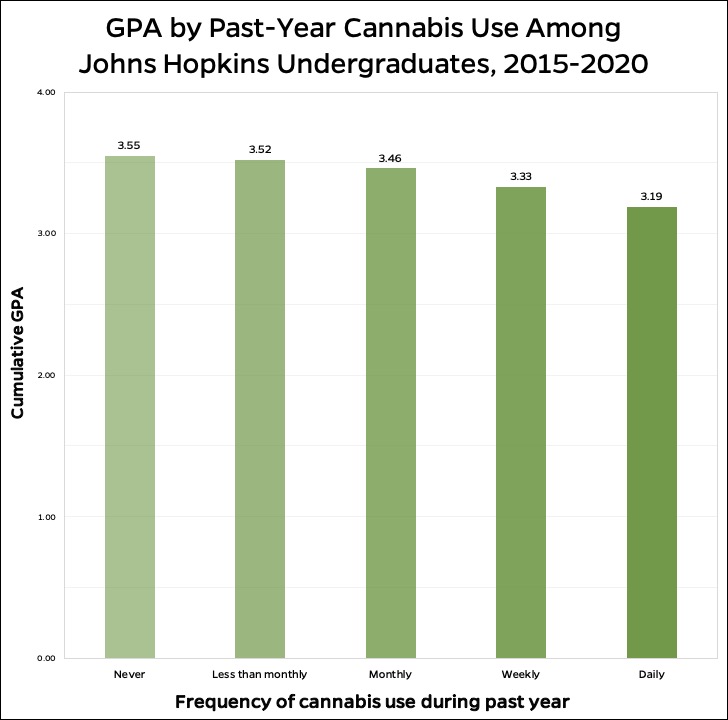Marijuana is the most widely used illicit substance by college students in the U.S. It’s also the second most used substance after alcohol.
While you may have heard varying information about the benefits and risks of marijuana, it never hurts to read about the most up-to-date findings. Research continues to emerge as we learn more about how marijuana works in the body and on the mind.
1. Marijuana affects your sleep.
While using marijuana may be associated with falling asleep more quickly, it also reduces the amount of time in rapid eye movement (REM) sleep. REM sleep is most associated with dreaming.
2. Marijuana affects your academic success.
The Maryland College Alcohol Survey found that Johns Hopkins students who did not use marijuana in the past year had significantly higher GPAs than students who had used marijuana in the past year.

3. Marijuana contains more than 100 substances, called cannabinoids. The two most well understood are tetrahydrocannabinol (THC) and cannabidiol (CBD), which each cause different effects.
Both are fat soluble, which means they are stored in the body’s fat and can show up on drug tests even weeks after use.
CBD is the component of marijuana that is often used for medicinal purposes. Research has shown it to be useful in combating certain types of childhood epilepsy.
THC is the psychoactive part of marijuana that causes users to feel high.
4. Marijuana strength has increased significantly since the 1960s.
From the 1960s through the 80s, the THC content in marijuana was less than 2%. In the 90s it rose to 4%. As recently as 2017, THC content had risen to 17-28% and can be even higher (up to 95%) in concentrated products. The increased potency has been associated with increased risk of addiction and worsening mental health problems.
5. The legal status of marijuana varies from place to place.
With so many policy changes in recent years, it can be confusing to know if it is legal to use marijuana or not in a variety of settings. Here are some of the terms you may be hearing.
- Decriminalized: Typically, personal use quantities of marijuana are now considered a civil offense, meaning they usually come with a fine and not jail time. Marijuana is decriminalized in Maryland.
- Medicinal: Medical cards can be provided from a licensed medical provider for a specific list of conditions, which ranges in each state. This permits purchase of limited quantities of marijuana in dispensaries in some states, including Maryland.
- Recreational: Marijuana can be purchased and possessed without special permission from a doctor. States typically have restrictions such as purchasing age, quantity of possession, driving while impaired, or limitations on where marijuana can be used.
- Illicit: All marijuana use and possession is illegal. This is the status of marijuana according to the federal government, regardless of state or local policies. That is why marijuana cannot be used on any Hopkins campus under any circumstances.
6. Increased use of marijuana products, such as edibles, that take longer for the effects of marijuana to be noticed by the user has been related to increased cases of acute marijuana toxicity.
Typical symptoms may include:
- Hypotension
- Panic
- Anxiety
- Delirium
- Impaired balance or coordination
- Muscle spasms
7. When someone stops using marijuana, they may experience negative physical and psychological effects called withdrawal.
Some of the symptoms are:
- Mood changes
- Irritability
- Trouble sleeping
- Loss of focus
- Nausea
8. Simultaneous Alcohol and Marijuana Use (SAM) is riskier than using either substance by itself.
Using alcohol and marijuana together, so that the effects of each overlap, is associated with more risks than using either substance on its own. These can include unsafe driving, social consequences, physical health problems, and greater risk of substance misuse.
9. Hopkins has a dedicated Alcohol and Other Drugs Education Specialist.
All Hopkins students, regardless of school or location, can schedule an appointment with the Alcohol and Other Drugs Education Specialist to discuss their marijuana use.